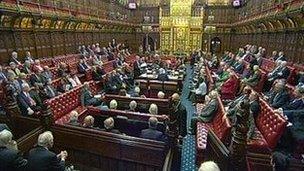Lords reform: Timetable motion to be tabled in autumn
- Published

Supporters of House of Lords reform say it is a century overdue
The government is to table a new proposed timetable for the Lords reform bill in the autumn, Commons leader Sir George Young has told MPs.
David Cameron was forced to abandon a vote on a timetabling motion on Tuesday after Labour and dozens of Tory MPs threatened to defeat the coalition.
If debates are not time-limited, the bill is almost certain to fail.
Sir George said the government wanted to hold discussions to allow the main parties to "build a consensus".
The coalition's plans, promoted most strongly by the Liberal Democrats, involve making 80% of peers elected, rather than appointed, and cutting the number of members of the Lords from 825 to 450.
Supporters say the "democratic" changes are long overdue and will improve Parliament.
But opponents argue that they are ill thought-out, could undermine the "supremacy" of the House of Commons and should not be a priority at a time of economic uncertainty.
They also dislike the idea that peers would be elected for 15-year terms, with voters given a choice between selecting individuals and those on party lists, which they say would undermine candidates' independence of thought.
'Reflect'
On Tuesday, the government decided not to go ahead with the programme motion to restrict the next stage of debate on the bill to 10 days, for fear it would lose against opposition from Labour and up to 100 backbench Tory MPs.
When the vote on whether the bill itself should go through to its next stage, it passed comfortably, by 338 votes, with Labour supporting the idea of reform, but 91 Conservatives went against the leadership.
It was the biggest rebellion since the coalition came to power in 2010.
As it stands, when the bill is debated in future there would be no time limit, meaning opponents could "filibuster", making such long speeches that it clogs up Parliament and prevents other business from going ahead.
Sir George told MPs: "We want to reflect. We want to allow time for meaningful discussion, including with the opposition and other honourable members, to build a consensus on the best way forward."
He added: "We do intend to table a timetable motion for the bill in the autumn but as the House would expect we would want those discussions to take place first before I can give the House any further information."
Supporters of reform are expected to speak to rebels over the summer, though a government source acknowledged that some of them would prove "unbudgeable".
At a meeting of backbench Conservative MPs on Wednesday, the prime minister said he would have "one more try" at promoting the bill and if that failed he would "draw a line" and move on.
'Deal's a deal'
He also raised the prospect of a compromise on the the plans, with a "smaller elected element" for the second chamber.
This would anger many Lib Dems, for whom reform of the Lords is a key policy.
For Labour, shadow Commons leader Angela Eagle said the government's plans had descended into farce and called for "genuine cross party" discussions on the way forward.
She told MPs: "A 10%-elected chamber would not be a compromise; it would be the Liberal Democrats running up the white flag."
Conservative MP Louise Mensch, who rebelled in the vote on the Lords, said reducing the number of peers to be elected would not change her mind.
She told 91Čȱ¬ Radio 4's Today programme: "The problem that many people have with the proposals as outlined is not the proportion to be elected; many people actually want a fully elected second chamber.
"The problem is, as written, senators hand-picked by the party whips, who are elected on a 15-year term on ÂŁ300 a day and never have to face the electorate again. To a lot of us that doesn't sound like democracy, whether the proportion is 50%, 80% or 100%."
Mr Cameron was warned by Deputy Prime Minister and Lib Dem leader Nick Clegg earlier that the coalition had entered a "contract" to get the plans through.
He said: "A deal's a deal and it's important you stick to that deal and you stick to the contract, if you like, that you have entered into."
The programme motion was abandoned with the agreement of Mr Clegg on the understanding that Mr Cameron needed more time to win over his MPs.
- Published11 July 2012
- Published11 July 2012
- Published10 July 2012
- Published11 July 2012
- Published6 August 2012
- Published11 July 2012
- Published11 July 2012